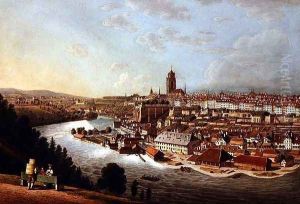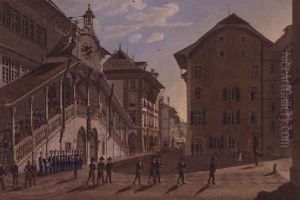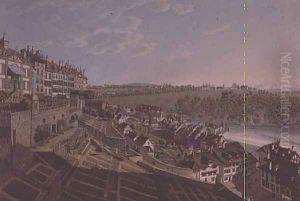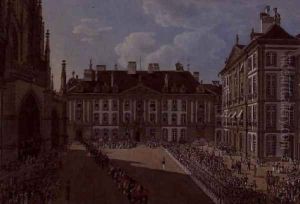Franz Schmidt Paintings
Franz Schmidt was an Austrian composer, cellist, and pianist, born on December 22, 1874, in Pressburg, then part of Austro-Hungarian Empire, which is now known as Bratislava in Slovakia. He spent most of his career in Vienna, which was a hub for composers and musicians during his lifetime. Schmidt's contributions to music are often associated with the late-Romantic period, and his works are known for their lush harmonies, complex counterpoint, and expansive structures.
Schmidt began his musical education at the Conservatory of Vienna in 1890, where he studied cello with Ferdinand Hellmesberger and composition with Robert Fuchs and Anton Bruckner. His talent was evident early on, and upon graduating in 1896, he joined the Vienna Court Opera Orchestra as a cellist. He played there until 1914, also becoming a member of the Vienna Philharmonic Orchestra.
In 1914, Schmidt left his orchestral positions to focus on composition and teaching. He began teaching at the Vienna State Academy of Music and Dramatic Art, where he eventually became a professor in 1925, and later, director in 1927. Schmidt was highly respected as a teacher and influenced a generation of Austrian musicians. Among his notable students were Theodor Berger, Marcel Rubin, and Alfred Uhl.
Throughout his life, Schmidt composed a variety of works, including four symphonies, two operas, chamber music, piano music, and choral works. His most celebrated pieces include his four symphonies, the opera 'Notre Dame', and his 'Das Buch mit sieben Siegeln' (The Book with Seven Seals), an oratorio based on the Book of Revelation. Schmidt's music often reflects a synthesis of traditional and late-Romantic styles, with a particular affinity for complex counterpoint, which he had admired in the works of Johann Sebastian Bach.
Despite the acclaim he received for his music, Schmidt faced personal tragedies that affected his life and work. The death of his daughter Emma in childbirth was a profound loss that influenced the composition of his Fourth Symphony, considered by many to be his masterpiece, an elegy to her memory. Schmidt's own health deteriorated in the latter part of his life, and he struggled with heart disease and other ailments.
Franz Schmidt passed away on February 11, 1939, in Perchtoldsdorf, near Vienna. His death marked the loss of one of Austria's significant composers of the early 20th century. While Schmidt's works were somewhat neglected after his death, particularly during the Second World War and in the post-war era, there has been a resurgence of interest in his music, with new recordings and performances bringing his compositions back to the concert hall and to a new generation of listeners.







